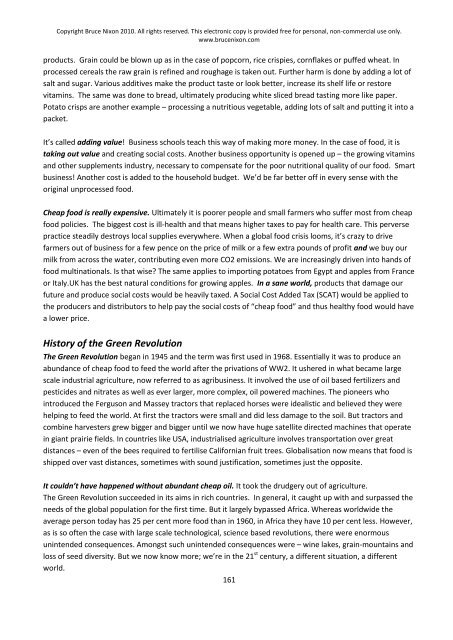A better world is possible - Global Commons Institute
A better world is possible - Global Commons Institute
A better world is possible - Global Commons Institute
Create successful ePaper yourself
Turn your PDF publications into a flip-book with our unique Google optimized e-Paper software.
Copyright Bruce Nixon 2010. All rights reserved. Th<strong>is</strong> electronic copy <strong>is</strong> provided free for personal, non-commercial use only.<br />
www.brucenixon.com<br />
products. Grain could be blown up as in the case of popcorn, rice cr<strong>is</strong>pies, cornflakes or puffed wheat. In<br />
processed cereals the raw grain <strong>is</strong> refined and roughage <strong>is</strong> taken out. Further harm <strong>is</strong> done by adding a lot of<br />
salt and sugar. Various additives make the product taste or look <strong>better</strong>, increase its shelf life or restore<br />
vitamins. The same was done to bread, ultimately producing white sliced bread tasting more like paper.<br />
Potato cr<strong>is</strong>ps are another example – processing a nutritious vegetable, adding lots of salt and putting it into a<br />
packet.<br />
It’s called adding value! Business schools teach th<strong>is</strong> way of making more money. In the case of food, it <strong>is</strong><br />
taking out value and creating social costs. Another business opportunity <strong>is</strong> opened up – the growing vitamins<br />
and other supplements industry, necessary to compensate for the poor nutritional quality of our food. Smart<br />
business! Another cost <strong>is</strong> added to the household budget. We’d be far <strong>better</strong> off in every sense with the<br />
original unprocessed food.<br />
Cheap food <strong>is</strong> really expensive. Ultimately it <strong>is</strong> poorer people and small farmers who suffer most from cheap<br />
food policies. The biggest cost <strong>is</strong> ill-health and that means higher taxes to pay for health care. Th<strong>is</strong> perverse<br />
practice steadily destroys local supplies everywhere. When a global food cr<strong>is</strong><strong>is</strong> looms, it’s crazy to drive<br />
farmers out of business for a few pence on the price of milk or a few extra pounds of profit and we buy our<br />
milk from across the water, contributing even more CO2 em<strong>is</strong>sions. We are increasingly driven into hands of<br />
food multinationals. Is that w<strong>is</strong>e? The same applies to importing potatoes from Egypt and apples from France<br />
or Italy.UK has the best natural conditions for growing apples. In a sane <strong>world</strong>, products that damage our<br />
future and produce social costs would be heavily taxed. A Social Cost Added Tax (SCAT) would be applied to<br />
the producers and d<strong>is</strong>tributors to help pay the social costs of “cheap food” and thus healthy food would have<br />
a lower price.<br />
H<strong>is</strong>tory of the Green Revolution<br />
The Green Revolution began in 1945 and the term was first used in 1968. Essentially it was to produce an<br />
abundance of cheap food to feed the <strong>world</strong> after the privations of WW2. It ushered in what became large<br />
scale industrial agriculture, now referred to as agribusiness. It involved the use of oil based fertilizers and<br />
pesticides and nitrates as well as ever larger, more complex, oil powered machines. The pioneers who<br />
introduced the Ferguson and Massey tractors that replaced horses were ideal<strong>is</strong>tic and believed they were<br />
helping to feed the <strong>world</strong>. At first the tractors were small and did less damage to the soil. But tractors and<br />
combine harvesters grew bigger and bigger until we now have huge satellite directed machines that operate<br />
in giant prairie fields. In countries like USA, industrial<strong>is</strong>ed agriculture involves transportation over great<br />
d<strong>is</strong>tances – even of the bees required to fertil<strong>is</strong>e Californian fruit trees. <strong>Global</strong><strong>is</strong>ation now means that food <strong>is</strong><br />
shipped over vast d<strong>is</strong>tances, sometimes with sound justification, sometimes just the opposite.<br />
It couldn’t have happened without abundant cheap oil. It took the drudgery out of agriculture.<br />
The Green Revolution succeeded in its aims in rich countries. In general, it caught up with and surpassed the<br />
needs of the global population for the first time. But it largely bypassed Africa. Whereas <strong>world</strong>wide the<br />
average person today has 25 per cent more food than in 1960, in Africa they have 10 per cent less. However,<br />
as <strong>is</strong> so often the case with large scale technological, science based revolutions, there were enormous<br />
unintended consequences. Amongst such unintended consequences were – wine lakes, grain-mountains and<br />
loss of seed diversity. But we now know more; we’re in the 21 st century, a different situation, a different<br />
<strong>world</strong>.<br />
161
















